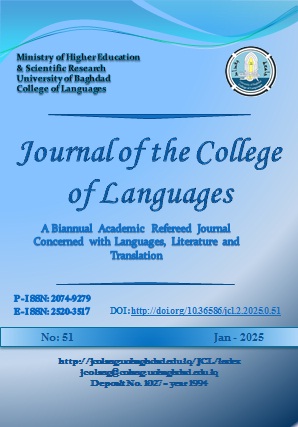Analysis of Argumentation in Surah Ad-Duha Based on Olivier Reboul's Argumentative Model
DOI:
https://doi.org/10.36586/jcl.2.2025.0.51.00019Keywords:
Argumentation, Argumentative Model, Olivier Reboul, Surah Ad-Duha.Abstract
Influencing others and persuasion in human dialogues is an active and prominent element. Thus, argumentation is one of the distinctive aspects of these dialogues. In other words, argumentation is one of the uses of language to persuade the audience. In this context, rhetoric plays a crucial role in the structure of discourses as it is linked to the use of language and styles related to the situation and conditions of sentence formation. From this perspective, rhetoric is not merely a tool for producing texts but rather one of the important tools for creating a horizon of vision for language and various discourse issues. By examining stylistic phenomena and studying their relationship with different levels of perception, the researcher in the field of rhetoric discovers the hidden psychological, cultural, and social layers of the text. One of the approaches to the analysis of argumentation is Olivier Reboul's rhetorical argumentation approach, which considers the rhetorical aspect in any discourse as something that makes that discourse persuasive, and this occurs through the unity of form and content. In this article, we aim to analyze the different levels of Surah Ad-Duha according to Reboul's model. The research findings show that in Surah Ad-Duha, all three pictorial sections of Reboul's model have been employed in line with the argumentative goal of the surah. At the phonetic level, there is a close relationship between sounds and connotations, which can be observed in the rhymed endings of the surah. In the structural images section, the use of elements such as ellipsis, oath, emphasis, and fronting and postponement has successfully contributed to achieving the argumentative goal of the surah.
References
Al-Alusi, Muhammad Ibrahim (1415 AH). Ruh al-Maani fi Tafsir al-Quran al-Azim wa al-Sab al-Mathani [The Spirit of Meanings in the Interpretation of the Great Quran and the Seven Oft-Repeated Verses]. Beirut: Dar al-Kutub al-Ilmiyah.
Al-Ansari, Ibn Hisham (1367 AH). Mughni al-Labib an Kutub al-Aarib [The -Sufficient of the Intelligent Concerning the Books of the Grammarians] (3rd Ed.). Qom: Intisharat Tabrizi.
Al-Ansari, Ibn Hisham (1990). Al-Sirah al-Nabawiyah [The Prophetic Biography]. Damascus: Dar al-Kitab al-Arabi.
Al-Baqillani (n.d.). Ijaz al-Quran [The Inimitability of the Quran]. Egypt: Dar al-Maarif.
Al-Jurjani, Abd al-Qahir (n.d.). Dalail al-Ijaz [Evidences of Inimitability]. Cairo: Matbaat al-Madani.
Al-Qayrawani, A. A. H.R (1963). Al-Umdah fi Mahasin al-Shir wa Adabihi wa Naqdihi [The Pillar in the Beauties of Poetry, Its Etiquettes, and Its Criticism]. (M. M. Abd al-Majid, Ed.) (3rd Ed.) Egypt: Maktabat al-Saadah.
Al-Rafii, Mustafa Sadiq (1973). Ijaz al-Quran wa al-Balaghah al-Nabawiyah [The Inimitability of the Quran and Prophetic Rhetoric]. Beirut: Dar al-Kitab al-Arabi.
Al-Salam, Abdullah (1991). Majaz al-Quran [Figurative Language in the Quran]. London: Manshurat al-Furqan li al-Turath al-Islami.
Al-Samurrai, Fadl (1998). Al-Tabir al-Qurani [Quranic Expression]. Amman: Dar Ammar.
Al-Saran, Muhammad (1997). Ilm al-Lughah [Linguistics]. Cairo: Dar al-Fikr al-Arabi.
Al-Suyuti, Jalal al-Din (1974). Al-Itqan fi Ulum al-Quran [The Perfect Guide to the Sciences of the Quran]. Egypt: Al-Hayah al-Misriyah al-Ammah li al-Kitab.
Al-Umri, Muhammad (2012). Al-Balaghah Bayna al-Takhyil wa al-Tadawul [Rhetoric Between Imagination and Pragmatics]. Morocco: Dar Ifriqiya.
Al-Zamani, Kamal (2016). Hijajiyat al-Uslub fi al-Khitabah al-Siyasiyah lada al-Imam Ali alayhi al-Salam [The Argumentative Style in the Political Speeches of Imam Ali, Peace Be upon Him]. Morocco: Alam al-Kutub al-Hadith.
Anis, Ibrahim (n.d.). Al-Aswat al-Lughawiyah [Linguistic Sounds]. Cairo: Maktabat Nahdat Misr.
Bint al-Shati, A. A. (n.d.). Al-Tafsir al-Bayani [The Rhetorical Interpretation]. Cairo: Dar al-Maarif.
Blieč, Hana (1999). Al-Balaghah wa al-Uslubiyah Nahwa Namudhaj Simaii li Tahlil al-Nass [Rhetoric and Stylistics: Towards a Semiotic Model for Text Analysis]. Beirut: Ifriqiya al-Sharq.
Ibn Ashur, Muhammad al-Tahir (1420 AH). Al-Tahrir wa al-Tanwir [Liberation and Enlightenment]. Beirut: Muassasat al-Tarikh al-Arabi.
Ibn Jinni, Abu al-Fath Uthman (n.d.). Al-Khasais [The Characteristics] (4th Ed.). Cairo: Al-Hayah al-Misriyah al-Ammah li al-Kitab.
Lushin, N.H (2001). Mabahith fi Ilm al-Lughah wa Manahij al-Bahth al-Lughawiyah [Topics in Linguistics and Linguistic Research Methods]. Alexandria: Al-Maktabah al-Jamiyah.
Najlah, M.A (1981). Lughah al-Quran al-Karim fi Juz Amma [The Language of the Noble Quran in Juz Amma]. Beirut: Dar al-Nahdah al-Arabiyah.
Perelman, C (2020). Al-Imbraturiyah al-Khitabiyah Sinaah al-Khitabah wa al-Hijaj [The Rhetorical Empire: The Making of Rhetoric and Argumentation]. Beirut: Dar al-Kutub al-Jadidah al-Muttahidah.
Qadir, F G. (2011). Tajalliyat al-Dalalah al-Ihaiah fi al-Khitab al-Qurani [Manifestations of Connotative Meaning in Quranic Discourse] ] (1st Ed.). Irbid: Alam al-Kutub al-Hadith.
Reboul, Olivier (2017). Madkhal ila al-Khitabah [Introduction to Rhetoric]. Morocco: Dar Ifriqiya al-Sharq.
Sammud, Hammadi (n.d.). Ahamm Nazariyat al-Hijaj fi al-Taqalid al-Gharbiyah min Aristu ila al-Yawm [The Most Important Theories of Argumentation in Western Traditions from Aristotle to Today]. Tunisia: Al-Matbaah al-Rasmiyah li al-Jumhuriyah al-Tunisiyah.
Sulah, Abd (2011). Fi Nazariyat al-Hijaj: Dirasat wa Tatbiqat [On the Theory of Argumentation: Studies and Applications]. Tunisia: Dar al-Janub li al-Nashr wa al-Tawzi.
Tarus, Muhammad (2005). Al-Nazariyah al-Hijajiyah min Khilal al-Dirasat al-Balaghiyah wa al-Mantiqiyah wa al-Lisaniyah [The Theory of Argumentation Through Rhetorical, Logical, and Linguistic Studies]. Qatar: Dar al-Thaqafah.
Downloads
Published
Issue
Section
License
Copyright (c) 2025 Journal of the College of Languages (JCL)

This work is licensed under a Creative Commons Attribution 4.0 International License.








